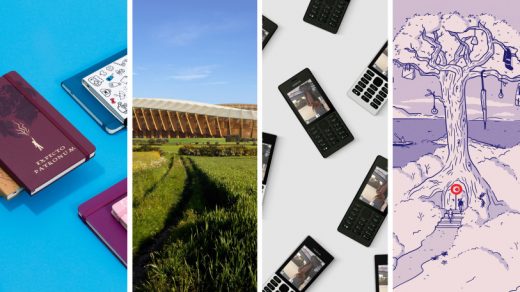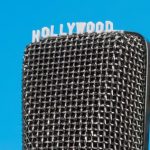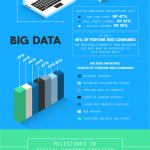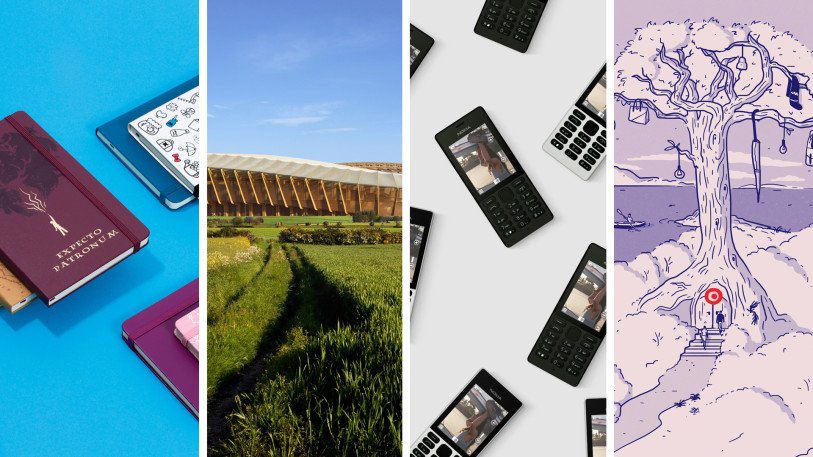Updates From Our Most Innovative Companies: Moleskine, Target, And More
The idea of a massive store that looks the same in every region is a thing of the past, at least for Target. In its place is a highly curated version tailored for dense urban areas. “How do we keep our store experience relevant?” asks Mark Schindele, Target’s SVP of properties. “We customize, we evolve, and we understand our guests.”
In 2017, Target will roll out 28 new flexible-format stores, double the number it opened in 2016. The company’s first small-store effort, City Target, which launched in six locations in 2012, averaged about 100,000 square feet, still too big a footprint for major cities. The company faced a challenge: how to condense even more while providing customers with a total Target experience. Flex formats shrink the size to as little as 12,000 square feet and tailor merchandise to specific neighborhoods. They also dropped the special moniker: All Targets, regardless of the size or shape, would be known as Target.

Manhattan got its first flex-format Target in October, in the Tribeca neighborhood, which has been flooded with stylish young families. The two-story outpost emphasizes apparel, toddler, and baby sections. (It’s also the only Target so far to include a Chobani yogurt café in place of the now-standard Starbucks.)
Target, which once stood for consistency and endless choice, now wants to be adaptable, streamlined, and quick—the company can research a new site and have doors open within a year. “We look at what needs aren’t being met by a neighborhood,” Schindele says. “And then we meet them.”
Milestones: Target recently hired former Walmart exec Shekar Natarajan to fill the new role of SVP of network planning and operational design. He is tasked with harnessing tech to speed up Target’s supply chain.
Challenges: Walmart attempted a similar curated-retail experiment with its Express stores but couldn’t nail the formula. It closed 102 of its smaller format locations in 2016.
Buzz: Positive
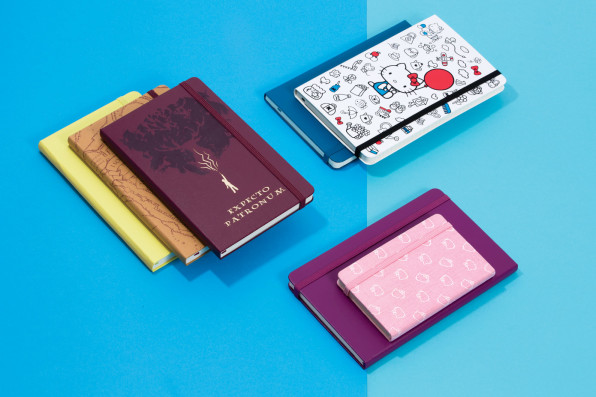
Moleskine
The success of Moleskine’s classic notebooks in a digital age has been compared to the resurgence of vinyl records or Polaroid cameras. But Moleskine knows that its future hinges on its ability to work in tandem with digital technology. A year ago, Moleskine released its Smart Writing Set, a pen and notebook that converts handwritten notes seamlessly from the page to an app. The company is now taking that idea a step further, leveraging its celebrated Timepage calendar app to work in conjunction with a new physical planner set to be released in 2017. Users can take a snapshot of the day’s to-dos, which the software will recognize and integrate with Timepage. Eventually, the tech could operate like the Smart Writing Set. “We don’t see analog and digital as antagonistic dimensions in the lives of real people,” says CEO Arrigo Berni.
To that end, Moleskine continues to ramp up its physical presence. In addition to opening 40 new retail stores by the end of 2018, the company is working on building out its Moleskine Cafés, which it built in Milan in 2016 and in the Geneva airport in 2015. Inspired by the café littéraires of the 17th century, these storefronts are part art gallery and part meeting space, and they also sell Moleskine products. In addition, Moleskine is expanding the company’s limited-edition notebook selection, which features characters from Hello Kitty, Harry Potter, Marvel and DC, Game of Thrones, Toy Story, and more. Moleskine, being Moleskine, manages to give them a chic spin. “There’s an emphasis on design and creativity with everything we do,” Berni says. “As a brand, we stand for the possibility of expressing yourself in all different forms.”
Milestones: Belgian vehicle importer D’Ieteren acquired Moleskine in 2016, giving it a new valuation of almost $600 million.
Challenges: The brand will have to preserve its creative cachet as it grows so that it doesn’t lose its cult following—as when Starbucks lost the coffee diehards.
Buzz: Positive
Nokia
Milestones: The Nokia brand is returning to phones after being licensed to HMD Global. The $26 Nokia 150 has a monthlong battery and doesn’t look too far off from the Nokia you loved in the mid-aughts.
Challenges: Nokia/HMD is entering into an especially crowded Android marketplace, where many companies don’t ever reach profitability. In addition, the Google Play Store is currently not available in China, which is the new Nokia 6 smartphone’s first market.
Buzz: Negative
Nestlé
Milestones: Scientists at Nestlé figured out how to cut sugar in choc-olate by 40%, by making it dissolve quicker to trick the taste buds. Products will roll out in 2018, with gradually reduced sugar so consumers don’t notice a difference.
Challenges: Eighty-three percent of Nestlé’s revenue comes from its slow-growing food and beverage divisions, compared to rival Unilever’s 43% in those sectors.
Buzz: Positive
First Solar
Milestones: The solar energy systems maker is accelerating production of its cost-efficient Series 6 module by a year (it will begin in 2018) and scrapping a planned Series 5 edition.
Challenges: The move is part of a restructuring that laid off more than 25% of its workforce in an effort to better compete in an overstocked market and recoup lost profits.
Buzz: Neutral
Blippar
Milestones: Augmented-reality pioneer Blippar has added real-time recognition to its app, letting users scan more than 70,000 faces and pull up related info. It’s like Shazam for public figures.
Challenges: Blippar must contend with heightened competition from open-AR apps like Vuforia Studio Enterprise, which simplifies AR for businesses.
Buzz: Positive
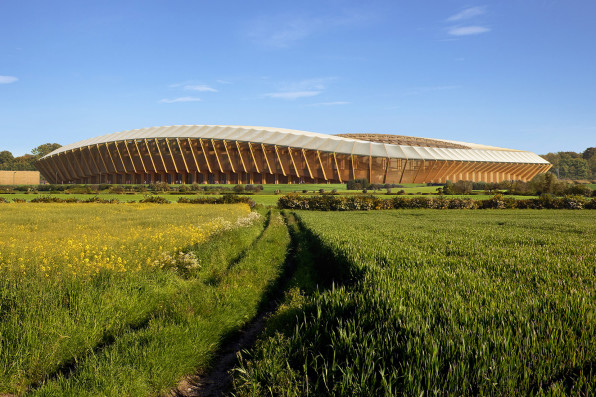
Zaha Hadid Architects
Milestones: The London-based architecture firm is set to build the world’s first all-wood stadium for the Forest Green Rovers soccer team in Stroud, England. The sustainable structure will have the lowest amount of embodied carbon of any stadium worldwide.
Challenges: Principal Patrik Schumacher recently came under fire for calling for the privatization of public spaces. The firm condemned the remarks, saying they were not consistent with the late Zaha Hadid’s way of thinking.
Buzz: Negative
Boeing
Milestones: Boeing has reorganized its military and commercial support into a new unit, Boeing Global Services, and has hired former GE Aviation exec Kevin McAllister to lead its commercial airline business.
Challenges: In December, Donald Trump tweeted that the order for Boeing’s new Air Force One should be canceled due to what he claimed was a $4 billion cost, causing its stock to slip 1.6%.
Buzz: Neutral
McDonald’s
Milestones: McDonald’s is selling its operations in China to state-owned Citic. The move allows McDonald’s to reap franchise fees while Citic uses its expertise to better target Chinese customers.
Challenges: The cost of labor is going up, and the chain’s revenue is still struggling to recover after drops in 2014 and 2015. It’s hard to keep McDonald’s franchisees happy when innovations like new digital kiosks come with a price tag of nearly $60,000 apiece.
Buzz: Neutral
Rent the Runway
Milestones: In December, the clothing rental company raised a $60 million round of funding and became profitable with $100 million in 2016 revenue. It also launched its first flagship store in New York: 5,000 square feet with personal stylists and store associates who tap into user data to personalize the shopping experience.
Challenges: Rent the Runway has partnered with Neiman Marcus to open RTR boutiques inside its department stores, which could be risky with Neiman Marcus’s recent revenue struggles, down 4.1% in 2016’s fourth quarter.
Buzz: Positive
Target
Fast Company , Read Full Story
(10)

